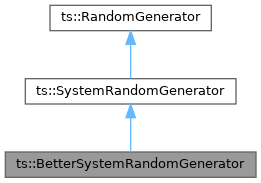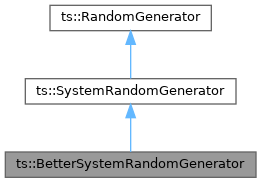 |
TSDuck v3.44-4578
MPEG Transport Stream Toolkit
|
 |
TSDuck v3.44-4578
MPEG Transport Stream Toolkit
|
Improved system-provided PRNG (pseudo-random numbers generator). More...
#include <tsBetterSystemRandomGenerator.h>


Public Member Functions | |
| virtual | ~BetterSystemRandomGenerator () override |
| Destructor. | |
| virtual UString | name () const override |
| Algorithm name (informational only). | |
| virtual bool | read (void *, size_t) override |
| Get random data. | |
| virtual bool | readByteBlock (ByteBlock &data, size_t size) |
| Get random data in a byte block. | |
| template<typename INT_T > requires std::integral<INT_T> | |
| bool | readInt (INT_T &value, INT_T min=std::numeric_limits< INT_T >::min(), INT_T max=std::numeric_limits< INT_T >::max()) |
| Get a random integer value inside a defined range. | |
| virtual bool | ready () const override |
| Check if the PRNG is ready. | |
| virtual bool | seed (const void *, size_t) override |
| Seed (add entropy) to the PRNG. | |
Static Public Member Functions | |
| static BetterSystemRandomGenerator & | Instance () |
| Get the instance of the singleton of this class. | |
Improved system-provided PRNG (pseudo-random numbers generator).
Use SystemRandomGenerator as base and add AES-based post-processing. Implemented as a thread-safe singleton.
An entropy state is stored in $HOME/.tsseed. The value of a state is initially loaded from this file. The first time the generator is used (no file), the state is loaded from the system PRNG.
A fixed AES-128 key K is used for the post-processing. The size of the state is 16 bytes, the AES block size.
Description of post-processing, added to the sytem PRNG:
Known limitations:
Additional notes:
|
static |
Get the instance of the singleton of this class.
|
overridevirtual |
Algorithm name (informational only).
Reimplemented from ts::SystemRandomGenerator.
|
overridevirtual |
Check if the PRNG is ready.
If not ready, it must be seeded again.
Reimplemented from ts::SystemRandomGenerator.
|
overridevirtual |
Get random data.
| [out] | addr | Address of returned random data. |
| [in] | size | Requested size in bytes of random data. The method always fill the buffer. |
Reimplemented from ts::SystemRandomGenerator.
|
overridevirtualinherited |
Seed (add entropy) to the PRNG.
| [in] | addr | Address of entropy data. |
| [in] | size | Size in bytes of entropy data. |
Implements ts::RandomGenerator.
|
virtualinherited |
Get random data in a byte block.
The default implementation uses read().
| [out] | data | Returned random data. |
| [in] | size | Requested size in bytes of random data. |
|
inherited |
Get a random integer value inside a defined range.
| INT_T | An integer type for the result. |
| [out] | value | The return integer value. |
| [in] | min | Minimum value to return. |
| [in] | max | Maximum value to return. |